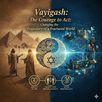Yitro: How To Not Spoil The People We Love
- Rabbi Yosef Vogel

- Feb 13, 2020
- 2 min read
Sometimes in life our intentions are good but the results are not. A prevalent example of this is being overly generous in an unhelpful way. We can all relate to the relationship between parents and children. Parents want what’s best for their children. Consequently, they provide a home imbued with love and a sense of security, and according to their means, they give their children modern material comforts, a good education and some financial assistance. This all sounds straightforward. So why so often do things go wrong? To be clear, the parent-child relationship is most complex. Indeed, Sigmund Freud believed that adult development was largely defined by the relationships that children share with their parents. There is a component in this relationship and most others that is both fundamental and most challenging. The reason for this is that it runs contrary to our human nature, especially as parents. Inherently we all love our children. Indeed it is the strongest form of natural love we know. This however creates a problem. It is often as a result of our profound love for our children, that we are no longer able to make a clear judgment about what is truly in their best interest. We have a good illustration of this in this week’s Torah portion. Prior to the revelation at Mount Sinai we read about an intriguing dialogue between Moses and his father in law Jethro. Upon observing the way in which Moses is providing counsel in settling disputes between the Jewish people, Jethro challenges his son in law by saying, “Why do you act alone? “The thing you are doing is not right.” (Exodus 18:14-17) The Rebbe explains that Moses desired that which he believed was best for the people he loved dearly. He wanted to be the sole provider of their spiritual growth and development. He did not want to delegate this responsibility to someone else who knew or cared less. Jethro, however, challenges and eventually convinces Moses that this premise is not healthy, nor sustainable in the long term. Firstly, human beings want and need to earn what they have. “A person prefers one measure of his own produce to nine measures of another’s produce.” (Bava Metzia 38:1) Secondly, if we don’t allow our children to navigate their lives independently, we are denying them the ability to fully mature and realise their true potential, enabling them to become self sufficient. The greatest gift that we can bestow upon our children is the ability to care for themselves and achieve that dignified independence which is an indispensable part of any human being's growth and happiness.







Comments